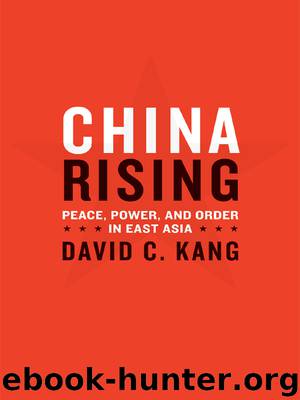China Rising by David C. Kang

Author:David C. Kang
Language: eng
Format: epub
Tags: Political Science/International Relations/General
Publisher: Columbia University Press
Published: 2011-09-10T04:00:00+00:00
THE UNITED STATES IN SOUTHEAST ASIA
In contrast to China’s increased presence in Southeast Asia, over the past thirty years the United States’ diplomatic and military presence has significantly diminished. In particular, the 1997 Asian financial crisis and the “global war on terror” have caused Southeast Asian states to reconsider their relations with the United States. Although all countries in the region want to maintain good relations with America, the latter’s influence is less pervasive now. Noting this trend, two former U.S. ambassadors to the region wrote in 2005 that the U.S. presence in Southeast Asia is receding, lacks coherence, and that “the current U.S. approach to the area has been spasmodic: some counter-terrorism effort here, a bit of development financing there, an occasional presidential visit, and frequent statements about the glories of ASEAN.”115
Gradual economic success in some of the Southeast Asian states in the 1980s had caused the United States to begin to pressure them for greater economic concessions and to become less willing to subsume economic relations to geopolitical considerations.116 This hinted at the beginnings of a divide between the United States and its ASEAN allies. The ASEAN states began to explore alternative or complementary security arrangements to the United States, such as the ASEAN Regional Forum (ARF). At the 1987 ASEAN summit, ASEAN had made clear its interest in exploring “possible relations with additional third countries [i.e., not the U.S.],” with a view toward mitigating its dependence on the U.S.117 As Andrew MacIntyre and Barry Naughton observe, “The United States had economic interests that conspicuously conflicted with those of [East Asia], and it prosecuted these interests through other channels, with muscular approaches to bilateral economic relations and multilateral agreements… if the United States was a goose, it had a very different flight path.”118
The United States, although an important actor in the region, is also absent from much of the integration that is taking place. For a long time the United States resisted most proposals by East Asian states to form coalitions. In 1989, Australia proposed the creation of APEC as a purely “East Asian” framework that excluded the United States. Then–Secretary of State James Baker protested strongly to Australia’s Foreign Minister Evans in 1989. The United States also opposed a proposal by Malaysia leader Mahatir Mohammed in 1990 to create an East Asian economic grouping.119 In 1997, the United States opposed a Japanese proposal to create an East Asian monetary fund, an action that might have lessened the shock of the crisis.120 The United States is either dismissive of, or excluded from, many of these institutions.121 That such vibrant institutionalization and integration of the region is occurring relatively unnoticed in the United States is significant.
In terms of overall presence and leadership, despite being welcomed in some areas the United States has also managed to provoke resentment in Southeast Asia. The U.S. presence in the region has been shaped fundamentally in the past decade by two major events—the Asian financial crisis that swept through the region in 1997, and the “global war on terror” (GWOT) that began after the terrorist attacks of September 11, 2001.
Download
This site does not store any files on its server. We only index and link to content provided by other sites. Please contact the content providers to delete copyright contents if any and email us, we'll remove relevant links or contents immediately.
| Anthropology | Archaeology |
| Philosophy | Politics & Government |
| Social Sciences | Sociology |
| Women's Studies |
The Secret History by Donna Tartt(19088)
The Social Justice Warrior Handbook by Lisa De Pasquale(12190)
Thirteen Reasons Why by Jay Asher(8909)
This Is How You Lose Her by Junot Diaz(6886)
Weapons of Math Destruction by Cathy O'Neil(6279)
Zero to One by Peter Thiel(5801)
Beartown by Fredrik Backman(5754)
The Myth of the Strong Leader by Archie Brown(5507)
The Fire Next Time by James Baldwin(5444)
How Democracies Die by Steven Levitsky & Daniel Ziblatt(5218)
Promise Me, Dad by Joe Biden(5153)
Stone's Rules by Roger Stone(5087)
A Higher Loyalty: Truth, Lies, and Leadership by James Comey(4963)
100 Deadly Skills by Clint Emerson(4925)
Rise and Kill First by Ronen Bergman(4788)
Secrecy World by Jake Bernstein(4753)
The David Icke Guide to the Global Conspiracy (and how to end it) by David Icke(4717)
The Farm by Tom Rob Smith(4509)
The Doomsday Machine by Daniel Ellsberg(4490)
